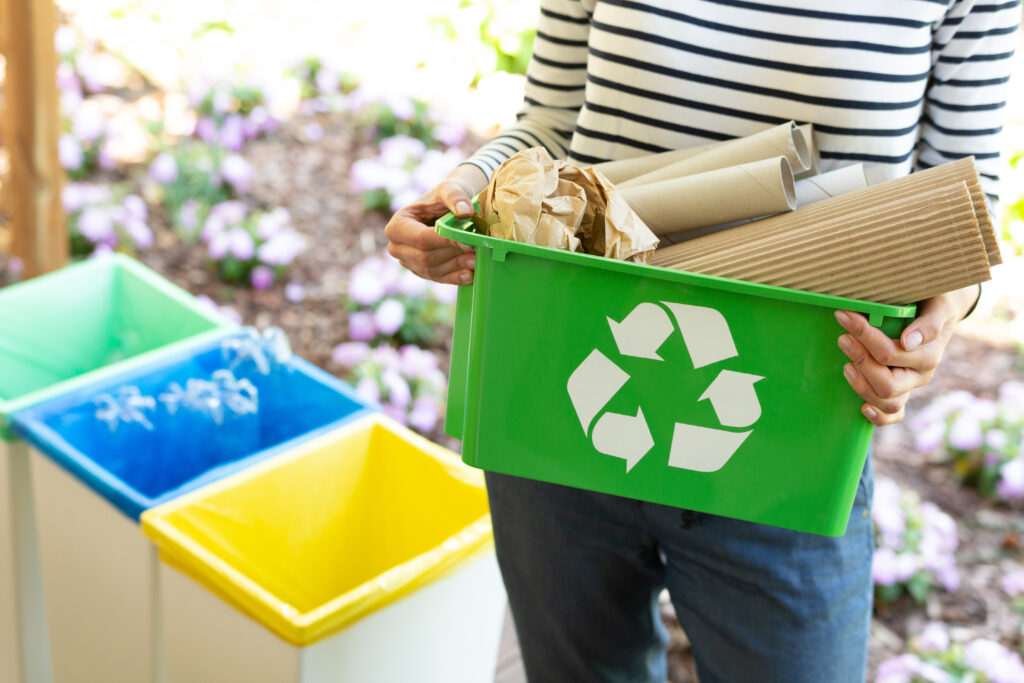In the UK, businesses must adhere to numerous pieces of environmental legislation, which work to promote sustainable practices, and make government protocols endurable for the long term.
One of the most impactful areas of regulation is waste management and recycling. As the government continues to push towards more ambitious environmental targets, these are continuously evolving.
The latest update – Simpler Recycling – is a government reform that aims to streamline how recyclable waste is collected and processed across England.
These new rules will bring significant changes, particularly for businesses, schools and other non-domestic premises.
Below, we’ve shared a comprehensive guide, with everything you need to know to prepare for these changes, and to remain legally compliant.

What are the Simpler Recycling Reforms?
Simpler Recycling is a government-led initiative, which will standardise the collection of recyclable waste across England.
Under the current systems, various approaches are in place across the country, as they are determined by local authorities. This has led to confusion and inefficiencies, both for domestic households and businesses.
These new rules will aim to:
- Simplify waste collection procedures
- Minimise the number of bins needed (for different waste types)
- Improve recycling rates
- Maximise environmental benefits (by ensuring more recyclable materials are successfully recovered
Critically, the Simpler Recycling reforms introduce a core set of waste streams, which all organisations must now follow when separating and disposing of their waste.
What types of waste do the reforms cover?
The regulations focus on four key categories of waste.
Waste must be separated (for recycling) into these categories:
- Residual waste – Non-recyclable materials, which cannot be disposed of via typical recycling streams.
- Food waste – Including any wasted food, spoiled food, or wasted food from food preparation. Businesses can also combine this with garden waste, if required.
- Paper and card – e.g. Newspapers, packaging, cardboard boxes and office paper.
- Dry mixed recyclables – e.g. Plastic containers, metal cans, glass bottles and glass jars.
Businesses must separate these waste types into clearly designated bins, bags, or stackable boxes.
Failure to do so could result in the contamination of recyclable waste (potentially meaning the items cannot be recycled). Non-compliance penalties may also be issued.
Which businesses are going to be affected?
These new regulations will apply to a wide range of premise types, including all non-domestic premises.
This includes:
- All businesses and commercial operations
- Public sector buildings (such as hospitals and council offices)
- Educational institutions
- Charities and community spaces
Businesses with 10 or more full-time equivalent employees must comply with these new waste management rules by 31 March 2025.
Smaller organisations (with fewer than 10 full-time equivalent employees) will still need to implement the changes, but they have an extended deadline, of 31 March 2027 to become compliant.
Why are these reforms important?
The government asserts that the Simpler Recycling reforms will be a vital step in its broader waste management strategy.
Together – alongside the Extended Producer Responsibility (EPR) for Packaging and the Deposit Return Scheme (DRS) for Drinks Containers – these reforms are projected to deliver significant environmental benefits.
If successful, these improvements will include:
- £11.8 billion in greenhouse gas emissions savings
- Marked progress toward the national target of recycling 65% of municipal waste by 2035
From the perspective of businesses, this also provides the opportunity for them to contribute to these critical climate goals, and develop sustainable, conscientious best practices.
How can EnviroCraft help?
At EnviroCraft, we provide advanced waste management software and automation tools that help businesses to maintain complete compliance with regulations such as Simpler Recycling.
With digital tools and ongoing support from EnviroCraft, businesses can adopt a more intelligent, data-driven approach to recycling.
To learn more about our innovative solutions and how they can support your business’s sustainability goals, get in touch with the EnviroCraft team.
The post New Simpler Recycling Regulations Guide appeared first on EnviroCraft Waste Solutions.














